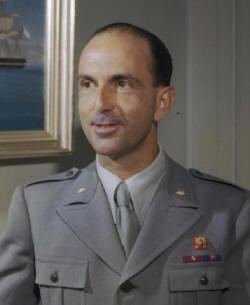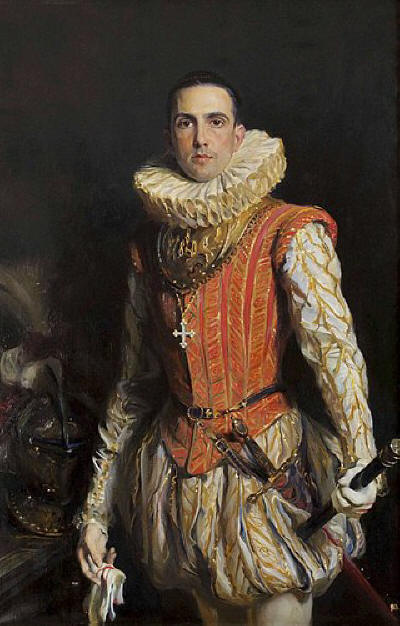

 Umberto
II of Italy (September 15, 1904 – March 18, 1983) was the last king of Italy.
Umberto II is said to have numbered among his lovers
Luchino Visconti,
Jean Marais and the boxer
Primo Carnera.
Umberto
II of Italy (September 15, 1904 – March 18, 1983) was the last king of Italy.
Umberto II is said to have numbered among his lovers
Luchino Visconti,
Jean Marais and the boxer
Primo Carnera.
Born in Turin as the second son of King Victor Emmanuel III, Umberto had a military education but also took a degree in law. Climbing through the ranks, he became a general in 1936 and four years later held nominal command of the Italian armies attacking France. However, when the king provoked the fall of Mussolini and switched his support to the Allies in 1943, they vetoed his plan to place Umberto at the head of the Italian army of liberation. Meanwhile, Mussolini, who had been freed by Nazi troops, had proclaimed the Republic of Salò (with himself as president) in northern Italy, which remained under the control of Nazi and Fascist forces. Fascist newspapers now began to attack the royal house; at this time were printed the first accusations about the homosexuality of Prince Umberto, whom they called ‘Stellassa’ (‘ Ugly Starlet’).
In 1944, after the liberation of Rome, Umberto began acting as regent for his father in an attempt to save the monarchy, which had been compromised by 20 years of support of Fascism. In May 1946, as the Italians prepared for a referendum to choose between a monarchy and a republic, Victor Emmanuel abdicated in favour of his son, who became King Umberto II. On 2 June 1946, voters decided in favour of a republic; 12 days later, Umberto left Italy. Hoping to regain his throne, he did not abdicate; his refusal to do so led to the inclusion of a clause in the constitution of republican Italy forbidding all first-born males of the royal family from returning to Italy. Umberto lived for the rest of his life in Cascais (Portugal) and in Geneva, where he died. He is buried in the Savoy family tomb in Haute-Combe, France.

Portrait by Philip de László, 1928
Thanks to the mediocrity of the Savoy dynasty to which he belonged, Umberto found himself in the rare position of being despised by both the right – which accused the royal family of treason – and by the left – which reproached the Savoy rulers for their support for the Fascists and Nazis. Because of this, Umberto did not benefit from the usual law of silence which surrounds the private life of those in power; anti-monarchist groups even took full advantage of accusations about his homosexuality in the lead-up to the referendum.
Only the ever-diminishing number of monarchists then showed concern about a book which appeared in the post-war years containing revelations about Umberto II. Enrico Montanari's work told how in 1927, when he was a young lieutenant in Turin, he was insistently courted by the then Prince Umberto, who even gave him a silver cigarette lighter bearing the inscription ‘Dimmi di sì!’ (‘ Say yes to me!’). No scandal arose from the hints contained in the biographies of the film-director (and duke) Luchino Visconti concerning – in more or less explicit terms – his relationship with the prince at the time when Umberto was considered one of the most eligible bachelors in Europe's royal families. Yet in 1930 Umberto married Princess Marie José of the Belgian Royal family, with whom he had four sons (including the current claimant to the Italian throne, Vittorio Emanuele). Nevertheless, the fact that the first was born only after four years of the couple's marriage gave rise to much gossip and rumours that the children had been conceived by artificial insemination; it was also said that they were the sons of other fathers, among them the Fascist leader Italo Balbo. Even Count Ciano, Mussolini's son-in-law, wrote in his diary on the occasion of a new pregnancy of Marie José: ‘I was left to understand that the child who will be born is his [Umberto's] without the intervention of doctors or syringes.’ This does not prove that the rumours were true – even if Domenico Bartoli comments on Ciano's assertions: ‘It can be seen that there were grains of truth to the gossip’ – but they do indicate the sort of notoriety which followed Umberto through his life. (Similar rumours circulated about his brother-in-law, Ludwig von Hassen).
Umberto did little to avoid such a reputation. For instance, he spent his wedding-night and his entire honeymoon in Courmayeur not with his wife but with a group of Turin officials and ‘friends’, to whom Umberto presented diamonds in the shape of a ‘U’. Afterwards, when Umberto called on his wife, he always had himself announced and visited her accompanied by someone else. It is not surprising that the Fascist secret police soon began to gather information about the ‘pederasty’ of the heir, either in order to blackmail him or as leverage to control him in the future, as Balbo himself disclosed to the king, in an attempt to safeguard himself from charges which enemies had circulated about his own relationship with Marie José. Furthermore, Umberto and his wife lived apart, except for a mimimun of contact necessary for the sake of appearances; they kept separate apartments, separate beds and separate friends.
Umberto, unlike his Savoy predecessors, was a fervent Catholic. He experienced his sexual transgressions, according to his biographers, as guilt-inducing erotic raptures. For Bartoli, ‘The prince was a true believer and a practising Catholic almost to the point of fanaticism. Therefore, sensual urges had a satanic origin, yet he was unable to resist them. … Thus the consequences of his sins became a devastating burden. The exact nature of the sins, however, could only be whispered.’
Umberto liked to choose his partners from the military, with a preference for officers – Visconti was an officer at the time of their liaison – rather than common soldiers. Later, in exile in Cascais, where Bartoli says euphemistically that the exking enjoyed no ‘female distractions’, he again chose his friends from among young regimental officers. Even before his marriage, Umberto's custom of giving a fleur-de-lis made of precious stones – the fleur-de-lis was a symbol of the Savoy dynasty – to the young officials and lovers in his entourage was well known; they flaunted the gifts in public.
Among his supposed lovers at the time were the handsome French actor Jean Marais (later the companion of Jean Cocteau) and the boxer Primo Carnera, who won the world boxing championship in 1933. In response to questions about why Umberto once wanted to meet him in private, Carnera (quoted in Petacco) simply answered that ‘the prince had received him wearing a swimming costume and asked him to go for a swim with him in the pool. They then spent the afternoon alone together.’ Clearly, bathing costumes are fit for a king – especially when the visitor is endowed with a fine physique.
My published books: